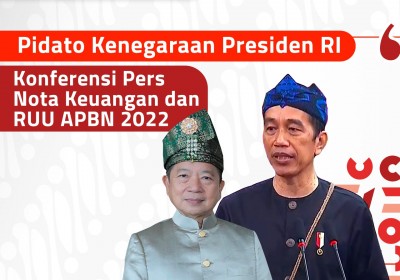Government Pushing Digital Ecosystem Development to Help Boost Productivity
August 18, 2021
JAKARTA – The willingness and courage to change for the better is fundamental towards building a better Indonesia in the face of the Covid-19 pandemic. To welcome the Industry 4.0 revolution, Indonesia is currently working hard to try and shift to newer, more effective, efficient and productive methods that will make this aim possible.
The Covid-19 pandemic has accelerated digital innovation to the point where it has become inseparable to the public's livelihoods. To support this, the government continues to push the development of the digital economy ecosystem to help boost public productivity.
"Participating in the digital economy is important because its massive potential is able to help ease enterprises such as micro-to-small-to-medium scale businesses (UMKM) to enter the global supply chain," said President Joko Widodo during the People's Consultative Assembly (MPR), House of Representatives (DPR) and Regional Representatives Council (DPD) annual hearings on Monday (16/8).
The number of UMKMs entering and utilizing online marketplaces and other online methods to sell their wares has increased during the pandemic period. As of August 2021, more than 14 million UMKMs, or 22% of Indonesia's total UMKMs, are running their business through online means. In 2020, the total digital transaction revenue in Indonesia reached more than Rp 253 trillion. This figure is predicted to rise to around Rp 330.7 trillion by 2021.
"Upgrading the scale of UMKMs remains our main priority. To do so, we have prepared a number of programs, such as encouraging partnerships with large-scale enterprises, to help UMKMs enter the global supply chain. Doing so will help improve UMKM competitiveness as well as help them achieve economic independence," President Joko Widodo said.
The President also stated that the government has launched an Online Single Submission (OSS) service that will help ease all businesses of all scales, especially those who are considered "low risk" enterprises.
"Through the OSS, the process of licensing and administering taxes and incentives will become easier, faster and more transparent. This opportunity must be used by UMKMs to develop their businesses," said President Jokowi.
In addition to this program, the government plans to also intensify its Made in Indonesia campaign to help improve the competitiveness of locally-made products on the global market.
The President added that 55% of the Indonesian economy's structure for all these years is made up of domestic/household consumption. The new trajectory going forward, he added, will be to foster a more productive structure by encouraging and promoting more effective upstreaming/downstreaming efforts, bring in more investment and boost exports.
Efforts to develop an infrastructure that would allow making logistics costs cheaper and to promote economic development in Indonesia's fringe areas is also on top of the government's economic agenda, as well as structural reforms that would strengthen economic inclusivity and sustainability.
"Developing quality UMKMs remains a priority, as well as developing an infrastructure that would help benefit small businesses and unite the Indonesian economy," said President Jokowi.
Meanwhile, Indonesia's total investment realization in the period of January to June 2021 (outside of the energy and finance sectors), reached Rp 442.8 trillion, with 51.5% of it coming from outside of Java, and 48.5% coming from Java. Such investments are instrumental in providing up to 620,000 jobs. Additional investment in the next few months is targeted to reach up to Rp 900 trillion and is expected to help create more jobs and significantly develop the economy.
The government's strategy so far in implementing such improvements looks to be working as in the second quarter of 2021, Indonesia achieved a 7.07% economic growth rate, with an inflation rate of 1.52%. Through its structural reformation efforts, the government is aiming to achieve an overall economic growth rate of 5% to 5.5% by 2022.
During a recent 2022 State Budget Bill (RUU APBN) press conference, Minister of National Development Planning/Head of Bappenas Suharso Monoarfa explained that the government's economic strategies for 2022 will mainly focus on growing the industrial sector, tourism, food security, UMKM welfare, infrastructure, digital transformation and also implement more carbon-friendly development practices.
Steps to implement these strategies would require increasing the added value of the industrial sector, increasing the capability of UMKMs to contribute to the national economy, and increasing the equal distribution of quality digital services and its infrastructure throughout Indonesia.
"These development targets are an aggregation of the implementation of these development programs, and are the result of agreements between various parties, including ministries and other relevant institutions," Minister Suharso said.
Indonesia’s Research Institutions Supporting the Development of the Electric Vehicle Industry
Indonesian Muslim Fashion and Cosmetics IKMs Shine at Dubai World Expo 2020
Govt Steps Up UMKM Transformation Efforts in the Midst of Pandemic Slowdown
Govt Encourages Promotion of IKM Products in Digital Era
Government Begins Developing Maritime Training Center in Makassar
Tweets by IDDevForum
